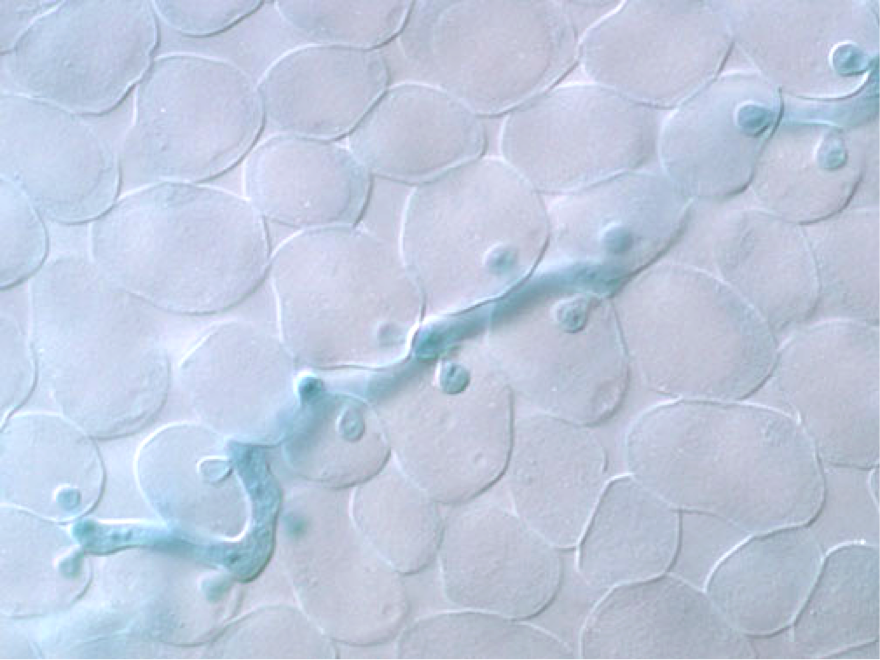Prof. Dr. Jane E. Parker
Research focus
We’re studying natural variation in plant responses to temperature and how this impacts stress hormone signalling balance, growth and fitness, as well as the structure of microbial endophyte populations. Experimentally, we’re subjecting diverse Arabidopsis thaliana accessions and genetically engineered lines to different temperature regimes within the normal range for this species and measuring the ‘extended’ plant-microbial phenotype. We aim then to test how variation observed under controlled conditions plays out in nature. This work should inform us about mechanisms underlying plant adaptation to temperature.
The ten most important publications
- Stuttmann J, Peine N, Garcia AV, Wagner C, Choudhury SR, Wang Y, James GV, Griebel T, Alcázar R, Tsuda K, Schneeberger K, Parker JE (2016) Arabidopsis thaliana DM2h (R8) within the Landsberg RPP1-like Resistance Locus Underlies Three Different Cases of EDS1-Conditioned Autoimmunity. PLoS genetics 12(4):e1005990.
- Le Roux C, Huet G, Jauneau A, Camborde L, Tremousaygue D, Kraut A, Zhou B, Levaillant M, Adachi H, Yoshioka H, Raffaele S, Berthomé R, Couté Y, Parker JE, Deslandes L (2015) A receptor pair with an integrated decoy converts pathogen disabling of transcription factors to immunity. Cell 161(5):1074-1088.
- Gloggnitzer J, Akimcheva S, Srinivasan A, Kusenda B, Riehs N, Stampfl H, Bautor J, Dekrout B, Jonak C, Jiménez-Gomez JM, Parker JE, Riha K (2014) Nonsense-mediated mRNA decay modulates immune receptor levels to regulate plant antibacterial defense. Cell host & microbe 16(3):376-390.
- Alcázar R, von Reth M, Bautor J, Chae E, Weigel D, Koornneef M, Parker JE (2014) Analysis of a plant complex resistance gene locus underlying immune-related hybrid incompatibility and its occurrence in nature. PLoS genetics 10(12):e1004848.
- Zbierzak AM, Porfirova S, Griebel T, Melzer M, Parker JE, Dörmann P (2013) A TIR-NBS protein encoded by Arabidopsis Chilling Sensitive 1 (CHS1) limits chloroplast damage and cell death at low temperature. Plant J 75(4):539-552.
- Wagner S, Stuttmann J, Rietz S, Guerois R, Brunstein E, Bautor J, Niefind K, Parker JE (2013) Structural basis for signaling by exclusive EDS1 heteromeric complexes with SAG101 or PAD4 in plant innate immunity. Cell host & microbe 14(6):619-630.
- Stuttmann J, Hubberten HM, Rietz S, Kaur J, Muskett P, Guerois R, Bednarek P, Hoefgen R, Parker JE (2011) Perturbation of Arabidopsis amino acid metabolism causes incompatibility with the adapted biotrophic pathogen Hyaloperonospora arabidopsidis. The Plant cell 23(7):2788-2803.
- Kim TH, Hauser F, Ha T, Xue S, Böhmer M, Nishimura N, Munemasa S, Hubbard K, Peine N, Lee BH, Lee S, Robert N, Parker JE, Schroeder JI (2011) Chemical genetics reveals negative regulation of abscisic acid signaling by a plant immune response pathway. Curr Biol 21(11):990-997.
- Heidrich K, Wirthmueller L, Tasset C, Pouzet C, Deslandes L, Parker JE (2011) Arabidopsis EDS1 connects pathogen effector recognition to cell compartment-specific immune responses. Science 334(6061):1401-1404.
- Alcázar R, García AV, Kronholm I, de Meaux J, Koornneef M, Parker JE, Reymond M (2010) Natural variation at Strubbelig Receptor Kinase 3 drives immune-triggered incompatibilities between Arabidopsis thaliana accessions. Nature genetics 42(12):1135-1139.
Prof. Dr. Jane E. Parker

Department of Plant Microbe Interactions
Max Planck Institute for Plant Breeding Research
